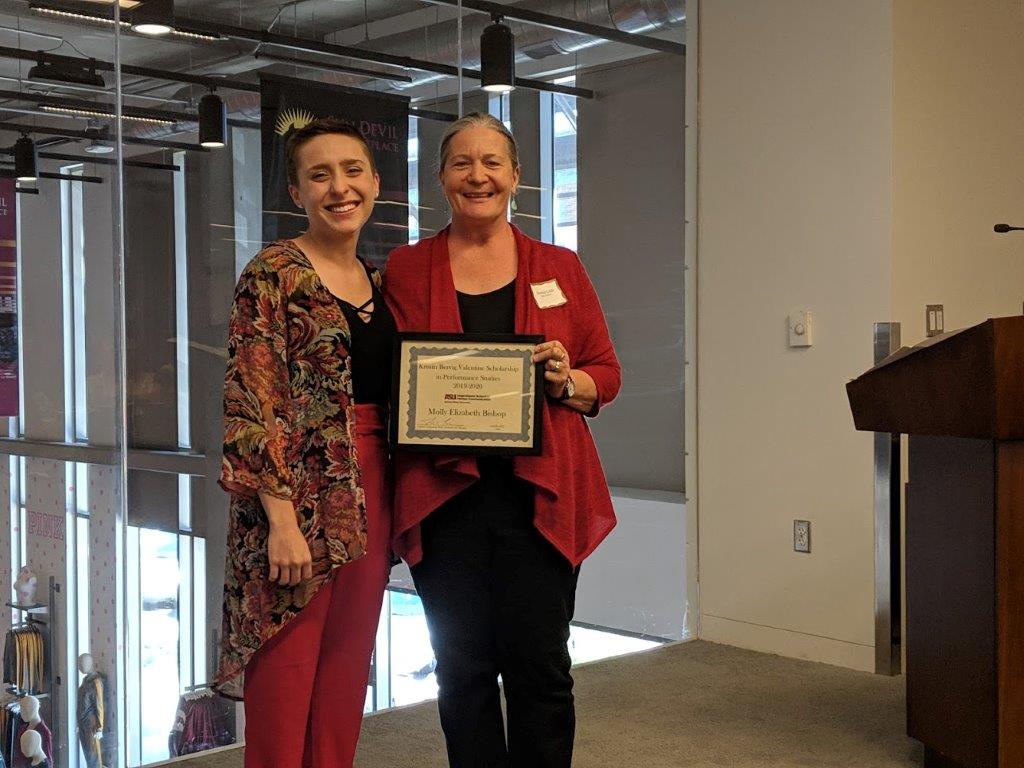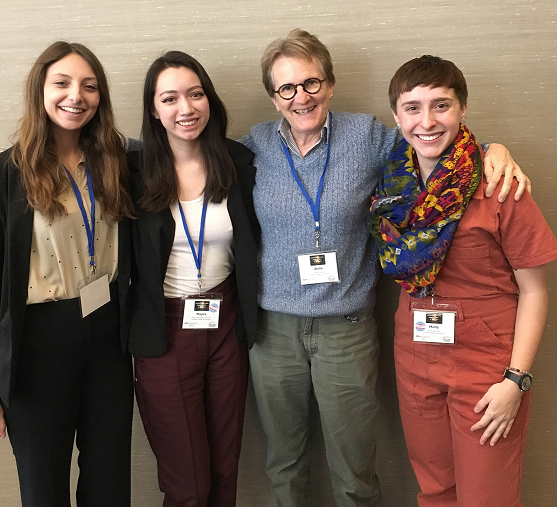Communication graduate finds a voice through performance

Molly Bishop
Editor's note: This story is part of a series of profiles of notable spring 2020 graduates.
For their honors thesis project, ASU senior Molly Bishop chose to give voice to students with mental illness using ethnographic research methods and performance at the Hugh Downs School of Human Communication.
Bishop, a member of Barrett, The Honors College, is graduating this spring with a BS in communication, a BA in theatre (Acting) and a gender studies certificate.
The goal of their thesis, said Bishop, was to "illuminate and improve the honors education experience."
For the performance, held at The Empty Space Theater, Bishop conducted interviews with fellow Barrett students "who also live with diagnosed mental health conditions."
The powerful stories told in "Crazy/Smart" were shared by cast members and fellow performance studies students at the Hugh Downs School. Both were followed by a discussion led by Bishop's thesis committee members Michael Rohd, institute professor in the Herberger Institute for Design and the Arts, and Jennifer Linde, principal lecturer and artistic director of The Empty Space.
"What resulted was something much larger than myself — making a performance using the interview material of other honors students who live with mental health conditions starts to tackle big-picture things all students face,” Bishop said.
"The way ableism, and more so, ableist ideology, structures and mediates education spaces is a battle many critical pedagogues have been fighting for a long time, but this was another piece of that investigation for myself, the performers and ASU."
Bishop said being able to dual-major was something that drew them to ASU in the first place, and connecting their experience in theater and technical skills gained from that degree with performance studies has really opened up their intellectual and professional world.
“Working with Jennifer Linde and the other performance studies faculty lets me continually challenge myself in this kind of work, and I couldn't have asked for a more supportive committee member for my thesis. My advice for everyone is to take some sort of communication course during your time at ASU, and seriously consider one in performance studies. I think it is a field people find surprisingly impactful and relatable, even when they work and have passions in STEM or other non-performance areas!"
Bishop was also the 2019 recipient of the Kristin Bervig Valentine scholarship, the creative leader of The Encyclopedia Show, and a trained facilitator of both Civil Dialogue and Storyscope.

Molly Bishop received the Kristin Bervig Valentine Undergraduate Scholarship in
Performance Studies in 2019 from Principal Lecturer Jennifer Linde.
“Molly also received a scholarship from Osher Lifelong Learning to create a course that promotes intergenerational dialogue and skill-building civility that reflects many of the skills Molly has learned as a communication major,” Linde said.
Bishop also earned a top paper award at the Western States Communication Association's (WSCA) 17th Annual Undergraduate Scholars Research Conference in February 2020, in Denver. The undergraduate conference is an opportunity for undergraduate scholars and researchers to showcase their scholarly and creative work and to receive feedback from experienced scholars in the field.
We recently asked Bishop to share more about their experiences at ASU:
Question: What was your “aha” moment, when you realized you wanted to study the field you majored in?
Answer: Communication was a field that mystified me — I didn’t have the “in” many students in the major do because my high school didn’t have a speech and debate program — until I took my first performance studies class. The work just “clicked” for me and I knew that, if I was going to continue doing performance work, if I was going to keep making art, the purposes I wanted it to serve and the knowledge and theory I wanted to fuel it with came from critical-cultural communication and performance studies. I enjoy the social science elements of communication and think performance is a necessary research method within the discipline.

Molly Bishop (far right) at the WSCA conference in Denver, where they received a Top Paper Award,
standing with fellow ASU students (left to right) Nicole Hinshaw and Mayra Vasquez-Chavez,
and Professor Belle Edson, director of undergraduate studies at the Hugh Downs School.
Q: What’s something you learned while at ASU — in the classroom or otherwise — that surprised you or that changed your perspective?
A: In ways implicit and explicit, ASU has continued to teach me about how to leverage what I know, whether it be connections, resources or knowledge, for the betterment of others. I went from a high school senior who cared about others but had no idea how to address cultural boundaries to an undergraduate senior who has much more of an idea but recognizes improving our communities is a lifelong journey.
The mentors I’ve met along the way: Jennifer Linde, Michael Rohd, Benny LeMaster and Belle Edson, have given me not just the chance to learn, but use that process of learning and my passion for sharing it. I now know how to verbalize how much I value equity, critical thinking and empathy.
Q: Why did you choose ASU?
A: I chose ASU because it provided me access to debt-free education, something I believe everyone is entitled to.
Q: What’s the best piece of advice you’d give to those still in school?
A: When you’re feeling nervous, your body is telling you what you’re nervous about is important and you might be feeling excited but not breathing through it. It’s okay! Take a second and keep going. You could be on your way to doing something amazing.
Q: What was your favorite spot on campus, whether for studying, meeting friends or just thinking about life?
A: The Hayden Library Charlie’s Café really helped me keep my life together some days!
Q: What are your plans after graduation?
A: I’m excited to start a new adventure taking my first ever break from being a full-time student before considering graduate school and hopefully moving to a new state.
More Arts, humanities and education

Honoring innovative practices, impact in the field of American Indian studies
American Indian Studies at Arizona State University will host a panel event to celebrate the release of “From the Skin,” a…

ASU alum's humanities background led to fulfilling job with the governor's office
As a student, Arizona State University alumna Sambo Dul was a triple major in Spanish, political science and economics. After…

ASU English professor directs new Native play 'Antíkoni'
Over the last three years, Madeline Sayet toured the United States to tell her story in the autobiographical solo-…